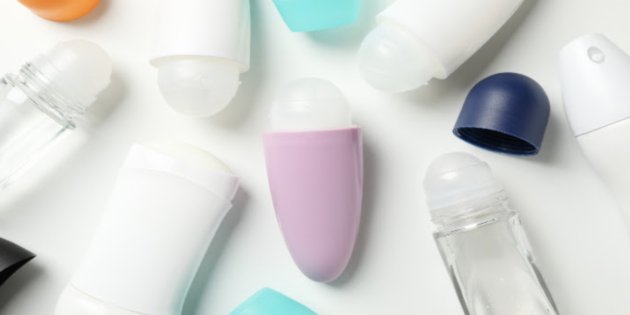The most commonly marketed deodorants make many promises, such as keeping your armpits dry and smelling good all day. However, what’s never mentioned in deodorant commercials are the potentially harmful ingredients like aluminum, parabens, and additives that may heighten the risk for breast cancer, weaken kidney function, cause acne, hair loss, and thyroid issues, as they seep into your body through your skin. In addition, there is still much to study on the long-term effects of antiperspirants. Fortunately, there are healthy, natural alternatives to commercial deodorants worth considering, such as:
Apple cider vinegar
While we have sweat glands all over our bodies, more body odor tends to come from our armpits because they’re located in a fold and don’t dry as quickly. Human sweat is odorless; it’s the bacterial growth and decomposition that results in body odor. Therefore, minimizing the smell coming from sweaty armpits starts with managing the smell-inducing bacteria.
Apple cider vinegar is known as an antiseptic and is also often used to dry out pimples. A study led by a team from the Department of Natural Sciences, School of Science and Technology, Middlesex University in London concluded that apple cider vinegar has multiple antimicrobial effects, including anti-fungal activity. [1]
Apple cider vinegar may be pungent; fortunately, the smell disappears fast. Rather than use cotton balls, an earth-friendly way to apply it would be to use a mini spray bottle filled with apple cider vinegar.
Change your diet
In a study identifying how sweat leads to odor generation, researchers observed specific bacterial enzymes that produced odor molecules like fatty acids, acetic acid, and thioalcohol. [2] These bacterial enzymes can come from the foods we eat; therefore, our diets play an essential role in the smells we secrete from our bodies.
Studies have shown that certain foods can have unpleasant effects when skin bacteria metabolize acidic sweat. Alcohol, for example, gets metabolized into acetic acid, which is secreted into your sweat. The same applies to red meat which contains smell-inducing sulfur. Therefore, a clean diet may help minimize body odor and the need to rely on commercial deodorants.
Coconut oil, cornstarch, and baking soda/arrowroot
Both coconut oil and baking soda are known for their antibacterial agents. Cornstarch, on the other hand, has an antiperspirant effect similar to store-bought deodorant. Cornstarch is generally interchangeable with arrowroot. Both are starch thickeners, so you can use them in identical amounts.
Coconut oil, cornstarch, and baking soda are often used as deodorant alternatives individually. However, when mixed into a paste, they may be an excellent homemade deodorant that’s easy to apply. Some optional additions to the recipe are essential oils. A helpful tip would be to keep the mixture cool and dry because it will liquefy under heat.
In a study on virgin coconut oil’s antibacterial and immunomodulatory activities, researchers observed that the oil had an inhibitory effect on certain infection-causing bacteria, specifically S. aureus. Coconut oil also has functional ingredients such as capric acid and caprylic acid that inhibit the growth of bacteria. [3]
Magnesium
Magnesium is another beneficial ingredient for deodorants. It acts as an antiperspirant. It helps kill the bacteria on the skin’s surface, providing a natural deodorant while also not blocking the sweat ducts. You may purchase a magnesium supplement and crush it into the coconut mixture to add the benefits of magnesium.
Now the great things about these ingredients are that they are white, so they don’t tend to stain your clothes when you sweat, and you can buy them anywhere, so even if you forgot your deodorant when on a trip, you can easily, quickly, and cheaply prepare your own.
There are also natural deodorants on the market that you may purchase. All you need to do is examine the ingredients. If these natural deodorants have the same or similar ingredients as the ones mentioned above, then they are great options saving you the hassle of preparing your own.
Takeaway
While commercial deodorants boast many benefits, the truth is that many contain potentially harmful ingredients that may put our health at risk. Consider healthy alternatives and lifestyle changes that may have the same odor-eliminating and antiperspirant effects.
Feel free to comment below and let me know what you liked best about this article.
Thank you for taking the time to read this. I’d be honored if you would share it with your family, friends, and followers by clicking the Like, Tweet, and Share buttons. If you are serious about improving your health no matter what your age or circumstances, and are ready to finally achieve optimal health and lose the weight you’ve been struggling with, then click HERE to check out my online Guerrilla Diet Wholistic Lifestyle Bootcamp for Healthy and Lasting Weight Loss.
If you are not already on my mailing list where you will receive my weekly articles packed with scientifically based health, and nutrition content, as well as many FREE bonuses and special offers, and much more, then click HEREto subscribe.
Thank You, 🙂
Dr. Galit Goldfarb
References
[1] Yagnik D, Serafin V, J Shah A. Antimicrobial activity of apple cider vinegar against Escherichia coli, Staphylococcus aureus and Candida albicans; downregulating cytokine and microbial protein expression. Sci Rep. 2018;8(1):1732. Published 2018 Jan 29. doi:10.1038/s41598-017-18618-x
[2] Lam TH, Verzotto D, Brahma P, et al. Understanding the microbial basis of body odor in prepubescent children and teenagers. Microbiome. 2018;6(1):213. Published 2018 Nov 29. doi:10.1186/s40168-018-0588-z
[3] Widianingrum DC, Noviandi CT, Salasia SIO. Antibacterial and immunomodulator activities of virgin coconut oil (VCO) against Staphylococcus aureus. Heliyon. 2019;5(10):e02612. Published 2019 Oct 20. doi:10.1016/j.heliyon.2019.e02612





Leave A Response